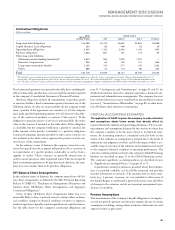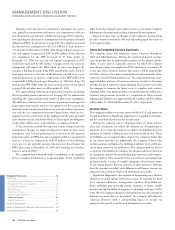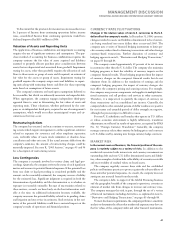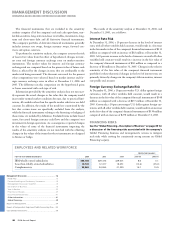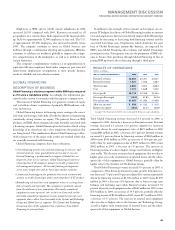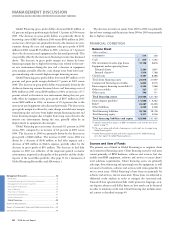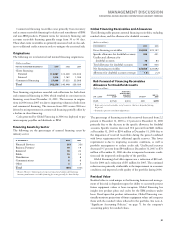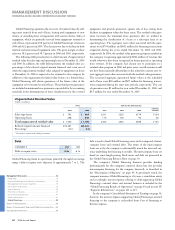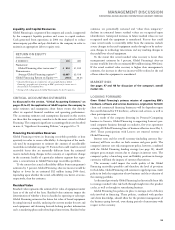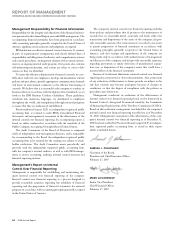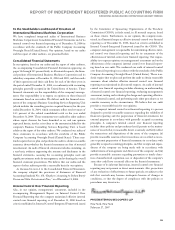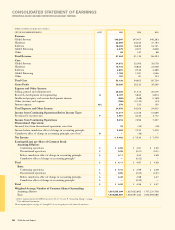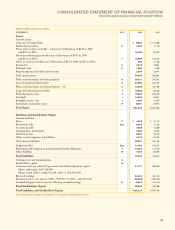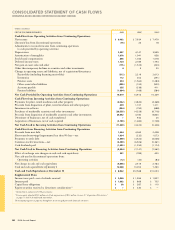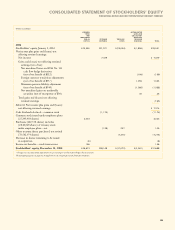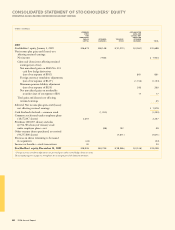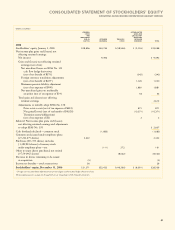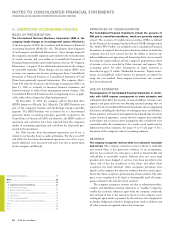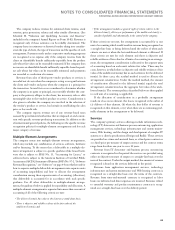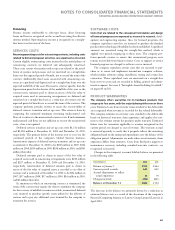IBM 2006 Annual Report Download - page 57
Download and view the complete annual report
Please find page 57 of the 2006 IBM annual report below. You can navigate through the pages in the report by either clicking on the pages listed below, or by using the keyword search tool below to find specific information within the annual report.
REPORT OF INDEPENDENT REGISTERED PUBLIC ACCOUNTING FIRM
INTERNATIONAL BUSINESS MACHINES CORPORATION AND SUBSIDIARY COMPANIES
To the Stockholders and Board of Directors of
International Business Machines Corporation:
We have completed integrated audits of International Business
Machines Corporation’s Consolidated Financial Statements and of its
internal control over financial reporting as of December 31, 2006 in
accordance with the standards of the Public Company Accounting
Oversight Board (United States). Our opinions, based on our audits
and the report of other auditors, are presented below.
Consolidated Financial Statements
In our opinion, based on our audits and the report of other auditors,
the accompanying Consolidated Financial Statements appearing on
pages 56 through 115 present fairly, in all material respects, the finan-
cial position of International Business Machines Corporation and its
subsidiary companies at December 31, 2006 and 2005, and the results
of their operations and their cash flows for each of the three years in
the period ended December 31, 2006, in conformity with accounting
principles generally accepted in the United States of America. These
financial statements are the responsibility of the company’s manage-
ment. Our responsibility is to express an opinion on these financial
statements based on our audits. We did not audit the financial state-
ments of the company’s Business Consulting Services Reporting Unit
(which includes the consulting practice acquired from us) for the year
ended December 31, 2004, which statements reflect total revenues of
14.3 percent of the related consolidated totals in the year ended
December 31, 2004. Those statements were audited by other auditors
whose report thereon has been furnished to us, and our opinion
expressed herein, insofar as it relates to the amounts included for the
company’s Business Consulting Services Reporting Unit, is based
solely on the report of the other auditors. We conducted our audits of
these statements in accordance with the standards of the Public
Company Accounting Oversight Board (United States). Those stan-
dards require that we plan and perform the audit to obtain reasonable
assurance about whether the financial statements are free of material
misstatement. An audit of financial statements includes examining, on
a test basis, evidence supporting the amounts and disclosures in the
financial statements, assessing the accounting principles used and
significant estimates made by management, and evaluating the overall
financial statement presentation. We believe that our audits and the
report of other auditors provide a reasonable basis for our opinion.
As discussed in note A to the Consolidated Financial Statements,
the company adopted the provisions of Statement of Financial
Accounting Standards No. 158, “Employers’ Accounting for Defined Benefit
Pension and Other Postretirement Plans,” as of December 31, 2006.
Internal Control Over Financial Reporting
Also, in our opinion, management’s assessment, included in the
accompanying Management’s Report on Internal Control Over
Financial Reporting that the company maintained effective internal
control over financial reporting as of December 31, 2006 based on
criteria established in Internal Control-Integrated Framework issued
by the Committee of Sponsoring Organizations of the Treadway
Commission (COSO), is fairly stated, in all material respects, based
on those criteria. Furthermore, in our opinion, the company main-
tained, in all material respects, effective internal control over financial
reporting as of December 31, 2006, based on criteria established in
Internal Control-Integrated Framework issued by the COSO. The
company’s management is responsible for maintaining effective inter-
nal control over financial reporting and for its assessment of the
effectiveness of internal control over financial reporting. Our respon-
sibility is to express opinions on management’s assessment and on the
effectiveness of the company’s internal control over financial report-
ing based on our audit. We conducted our audit of internal control
over financial reporting in accordance with the standards of the Public
Company Accounting Oversight Board (United States). Those stan-
dards require that we plan and perform the audit to obtain reasonable
assurance about whether effective internal control over financial
reporting was maintained in all material respects. An audit of internal
control over financial reporting includes obtaining an understanding
of internal control over financial reporting, evaluating management’s
assessment, testing and evaluating the design and operating effective-
ness of internal control, and performing such other procedures as we
consider necessary in the circumstances. We believe that our audit
provides a reasonable basis for our opinions.
A company’s internal control over financial reporting is a process
designed to provide reasonable assurance regarding the reliability of
financial reporting and the preparation of financial statements for
external purposes in accordance with generally accepted accounting
principles. A company’s internal control over financial reporting
includes those policies and procedures that (i) pertain to the mainte-
nance of records that, in reasonable detail, accurately and fairly reflect
the transactions and dispositions of the assets of the company; (ii)
provide reasonable assurance that transactions are recorded as neces-
sary to permit preparation of financial statements in accordance with
generally accepted accounting principles, and that receipts and expen-
ditures of the company are being made only in accordance with
authorizations of management and directors of the company; and (iii)
provide reasonable assurance regarding prevention or timely detec-
tion of unauthorized acquisition, use, or disposition of the company’s
assets that could have a material effect on the financial statements.
Because of its inherent limitations, internal control over financial
reporting may not prevent or detect misstatements. Also, projections
of any evaluation of effectiveness to future periods are subject to the
risk that controls may become inadequate because of changes in
conditions, or that the degree of compliance with the policies or
procedures may deteriorate.
PRICEWATERHOUSECOOPERS LLP
New York, New York
February 27, 2007
55
Black
MAC
CG10


